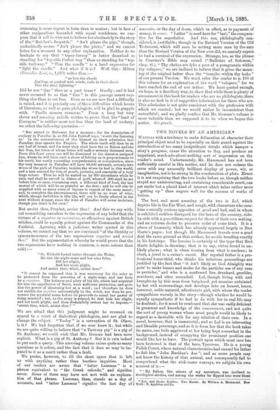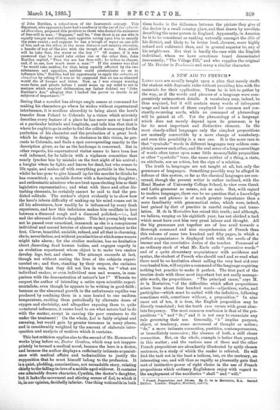TWO NOVELS BY AN AMERICAN.* WRITERS with a tendency to
make delineation of character their principal object need to be especially on their guard against the introduction of too many insignificant details which hamper a story's progress, cause the attention to flag, and produce an impatient, much-ado-about-nothing sort of impression on the reader's mind. Unfortunately, Mr. Hammond has not been sufficiently careful in this matter, and he does not redeem the error with any unusually brilliant display of power, wit, or imagination, nor is he strong in the construction of plots. Hence it is not surprising that the two books before us, though neither stupid nor uninteresting, and containing considerable merit, can yet excite bat a placid kind of interest which takes rather more " getting up " than augurs well for the success of works of fiction.
The best and most amusing of the two is Lal, which depicts life in the Far West, and rough, wild characters who combine comically curious opposites of good and bad, and in whom is exhibited reckless disregard for the laws of the country, sideby-side with a punctilious respect for those of their own making, and an extreme desire to preserve order of some kind. It is a phase of humanity which has already appeared largely in Bret Harte's pages ; but though Mr. Hammond travels over a good deal the same ground as that author, be avoids treading exactly in his footsteps. The heroine is certainly of the type that Bret Harte delights in drawing ; that is to say, virtue found in unlikely places ; what is clean issuing from what is unclean; in short, a jewel in a swine's snout. Her reputed father is a professional horse-thief, who thinks his nefarious proceedings are justified by the fact that " it isn't likely as God Almighty was goin' to make hosses and mules for the pertioler use of any cuss in petticler," and who is a confirmed liar, drunkard, gambler, murderer, and utter scoundrel. Lal, though living with and brought-up by this man from babyhood, yet remains untainted by her evil surroundings, and develops into an honest, brave, innocent, noble-natured, affectionate girl, with whom the reader sympathises warmly in the story—though whether he would be equally sympathetic if he had to do with her in real life may be doubted ; for it must be confessed that she was sadly deficient in grammar and knowledge of the convenances, and not quite the sort of young woman whom most people would be likely to regard as a desirable wife for any relation of their own. In a novel, however, that is immaterial; and as Lal is an interesting and likeable personage, and as it is from her that the book takes its name, one feels aggrieved at her being kept somewhat in the background, instead of occupying the prominent position one would like her to have. The portrait upon which most care has been bestowed is that of the hero, Tyscovus. He is a young Polish Count, whose natural characteristics had caused his father to dub him " John Buridan's Ass "; and as some people may not know the history of that animal, and consequently fail to comprehend what the nick-name conveys, we subjoin his own account of it :—
" My father, like others of my ancestors, was inclined to theological studies, and among the works he dipped into were those of John Buridan, a school-man of the fourteenth century. This disputant, who appears to have had a tendency to the use of the reductio ad absurdum, proposed this problem to those who denied the existence of free-will in man : "Suppose," said he, "that there is an ass who is equally hungry and thirsty, each appetite acting upon him to exactly the same extent ; and suppose he has a trough of water on one side of him and on the other, at the same distance and relative situation, a brindle of hay of like size with the trough of water. Now, which will be take first, the water or the hay ? " Of course, if it was answered that he would take either one or the other first, John Buridan replied, "Then the ass has free-will ; ho is free to choose, and, if an ass, bow much more a man ! " If the answer was that "he would take neither, for that, being equally affected by the two substances and appetites, neither could predominate so as to influence him," Buridan had his opportunity to apply the reductio ad absurdum by asking if it was to be supposed that an ass so situated would die of hunger and thirst. Now, as I was always wanting more facts and proofs before I could make up my mind to act in matters which required deliberation, my father dubbed me "John Buridan's Ass," alleging that I lacked the power to decide in all subjects of importance.' "
Seeing that a novelist has always ample means at command for making his characters go where he wishes without supernatural interference, it is needless absurdity to bring about the hero's transfer from Poland to Colorado by a vision which minutely describes every feature of a place he has never seen or heard of at a particular latitude and longitude, and tells him that that is where he ought togo in order to find the solitude necessary for the perfection of his character and the production of a great book which he designs writing. In obedience to this vision, he pro ceeds to Colorado, and finds a spot corresponding exactly to the description given, as far as the landscape is concerned. But in other respects, his supernatural visitor seems to have been less well informed, for he falls-in with a vigilance committee that nearly lynches him by mistake on the first night of his arrival ; a burglar whom he fights and leaves for dead, but who comes to life again, and makes-off with everything portable in the house, whilst he has gone to give himself up for the murder he thinks he has committed; a sociable doctor with a fascinating daughter ; and enthusiastic admirers who are bent upon electing him as their legislative representative ; and what with these and other dieturhing elements, he certainly cannot be said to find the predicted solitude. The author's object evidently is to show how the hero's inborn difficulty of making-up his mind comes out in all his adventures, how readily he is influenced by every fresh experience, and bow this indecision makes him oscillate in love between a diamond rough and a diamond polished,—i.e., Lal and the aforesaid doctor's daughter. This last young lady must not be passed over unnoticed, inasmuch as she is a conspicuous individual and second heroine of almost equal importance to the first. Clever, beautiful, amiable, refined, and all that is charming, she is, nevertheless, not without peculiarities at which some wooers might take alarm; for she studies medicine, has no hesitation about dissecting dead human bodies, and engages eagerly in an evolution experiment whose object is to make two snakes develop legs, feet, and claws. The attempt succeeds at last, though not without costing the lives of the subjects experimented on ; and then, standing by their corpses, she exclaims triumphantly that they did not live in vain, for " what are individual snakes, or even individual men and women, iu com parison with the demonstration of nature's law ?" Wherein we suspect the author of intending a satire upon scientific experi mentalists, even though he appears to be writing in good-faith ; because as the abnormal growth in the unfortunate reptiles was produced by confining them in a case heated. to one uniform temperature, exciting them periodically by alternate doses of oxygen and electricity, and altogether exposing them to quite unnatural influences, it seems hard to see what nature had to do with the matter, except in causing the poor creatures to die under the treatment I On the whole, Lal is fairly original and amusing, but would gain by greater terseness in many places, and is considerably weighted by the amount of elaborate introspection and analysis of motives which it contains.
This last criticism applies also to the second of Mr. Hammond's works lying before us, Doctor Grattan, which may not inappro priately be termed a medical novel, because the hero is a doctor, and because the author displays a sufficiently intimate acquaintance with medical affairs and technicalities to justify the supposition that he must himself belong to the profession. It is a quiet, plodding, eonscientions, not unreadable story, relating chiefly to the falling-in-love of a middle-aged widower. It contains one admirably drawn character, Cynthia, the doctor's daughter, but it lacks the movement and stirring scenes of La/, to which it is, in our opinion, decidedly inferior. One thing noticeable in both
these books is the difference between the picture they give of the doctor in a small country place, and that drawn by novelists describing the same person in England. Apparently, in America he is to be considered as ranking naturally amongst the (Hite of his district, and likely to be better bred, cleverer, more highly refined and cultivated than, and in general superior to, any of his neighbours. But that is hardly the case with the English individual, whom we have sometimes heard denominated irreverently, "The Village Pill," and who supplies the original of Mr. Hurter in Peadennis and many a similar character.



































 Previous page
Previous page